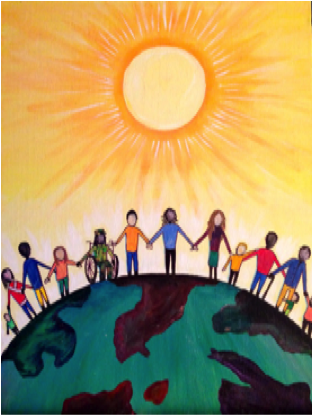Our History
The Trauma Resource Institute (TRI) was created in October of 2006 in order to bring biological interventions to the global community, based upon current science about the physiological and psychological impact of traumatic and highly stressful experiences. Elaine Miller-Karas, LCSW, is one of the founding directors of the Trauma Resource Institute and now serves as TRI’s Executive Director. She has also been and remains one of the key authors for the Trauma Resiliency Model (TRM)® and the Community Resiliency Model (CRM)®.
In 2001, Elaine Miller-Karas, LCSW met Geneie Everett, PhD through their shared interest in Somatic Experiencing®, a somatic intervention created by Peter Levine, PhD. In 2004, Elaine and Geneie were invited to go to Thailand after the Tsunami of December 26, 2004 and while in Thailand, shared a vision of creating a short-term biological intervention that could be easily accessed and taught to first-responders. Geneie had a background in critical care nursing and Elaine had been a medical social worker.
At the time, Elaine was the Associate Director of Behavioral Sciences at Arrowhead Regional Medical Center, the county hospital of San Bernardino County, teaching in the family practice residency program. She had already begun to create a short-term intervention to help the family practice interns and residents who cared for the highly traumatized inner city population of San Bernardino County. Geneie and Elaine co-created Trauma First Aide, a short term intervention, inspired by Peter Levine’s Somatic Experiencing®, Jean Ayres’ Sensory Integration Theory, Eugene Gendlin’s Focusing, basic biology and the laws of nature.
In 2006, Elaine Miller-Karas, Geneie Everett and Laurie Leitch conceptualized the idea of starting the Trauma Resource Institute. Laurie Leitch was part of the international team in Thailand with Elaine and Geneie. At the time, Laurie was the Research Director for Peter Levine’s organization although she did not contribute to writing Trauma First Aide.
Elaine’s association with the County of San Bernardino’s mental health system also informed her belief that there was a need for a brief training model because many front-line service providers simply did not have the time or funding to receive other longer models of training in biologically based interventions. Further, in cases of large-scale natural and human made disasters and in rural areas where there is limited access to mental health workers, biological stabilization skills need rapid dissemination to a large population of relief workers who aren’t necessarily trained mental health clinicians.
In January of 2007, Geneie decided to leave TRI and to start Trauma First Aide Associates. Elaine and Laurie went on to become the co-founders and co-directors of the Trauma Resource Institute. Elaine and Laurie began teaching Trauma First Aide together and later through their association, created TRI’s Trauma Resiliency Model which was inspired by Trauma First Aide. Elaine, along with a dedicated team (Peggy Rowe Ward, Ph.D., Jennifer Burton, LMFT, Jan Click, LCSW, Merdice Ellis, LMFT, Karen Banker, LCSW, Price Marshall, LMFT, Martha Parra, LCSW, Mark Dust, Ph.D. Candidate, and Marina Compean, LCSW) taught community members to be trainers in TRI’s Community Resiliency Model Innovation Project, part of the Mental Health Services Act Project funded by the State of California and San Bernardino County (2011-2013).
Guatemala, 2014
In March of 2011, the Department of Defense published a white paper, in which TRI’s Trauma Resiliency Model, was named a promising practice to help our returning veterans, active duty service members and their families.
In May of 2012, TRI’s Board of Directors asked Elaine to take the helm of the Trauma Resource Institute. Laurie Leitch resigned from the Trauma Resource Institute on June 15, 2012, to start a limited partnership with one of her associates. Elaine, Laurie and Geneie had a shared belief that innovation would enhance the healing of trauma in the world. So, although the three have been involved in separate endeavors, they remain involved in bringing forth healing strategies to help our world community.
TRI is experiencing rapid growth as individuals and organizations are hearing about the effectiveness of TRI’s models of intervention. CRM is developing its evidence base as randomized control trials have been conducted, demonstrating its effectiveness in reducing traumatic stress symptoms and improving wellbeing.
TRI’s international trainings have been co-sponsored by the World Health Organization in China; the Unitarian Universalist Service Committee in Haiti, Kenya, Nepal, the Philippines, Tanzania, and Turkey; Starfish One by One in Guatemala; the United Nations in Italy; and ADRA International in the Philippines. CRM skills have been incorporated into the Social, Emotional, and Ethical (SEE) Learning curriculum (i.e., an innovative K-12 education program developed by Emory University), which is bringing compassionate and ethical learning to children K-12 throughout the world. TRI has also provided international trainings in England, Germany, Iceland, India, Mexico, Northern Ireland, Rwanda, Ukraine, and South Africa.
Domestic trainings co-sponsorships have included the Department of Veteran Affairs and Department of Behavioral Health, San Bernardino, CA; Peace over Violence, Los Angeles, CA; Center for Community Solutions, San Diego, CA; Clear Path for Veterans, Syracuse, NY; Upaya Zen Center; the Veterans’ Administration, Los Angeles, CA; Children’s Hospital, Los Angeles, CA; Clearpath for Veterans; Loma Linda University; Sierra Tucson; Clearview Treatment Services; Crestwood Behavioral Health; Aspiranet; Mendocino County’s First Five; Santa Barbara County’s Drug and Alcohol Programs; Stanislaus County Disaster Response Department; Wake County Schools, NC; Emory University, School of Nursing, Atlanta, GA; Fighting Back Santa Maria Valley, CA; Smith College and Stanford University’s Perinatal Outreach Program; New Hanover County, NC; Arizona State University, AZ; Washington State Criminal Justice Training Commission (WSCJTC), WA; and the Christopher Wolf Crusade, GA.



